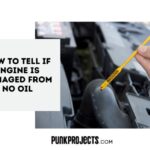How to Tell if Engine is Damaged From No Oil? Are you worried something may be wrong? If so, you’re probably wondering how to tell if your engine has been damaged from the lack of oil.
In this blog, we’ll highlight the signs to look out for and discuss what the next steps should be. So don’t fret, read on for more information!
No Oil On Dipstick Engine Damage
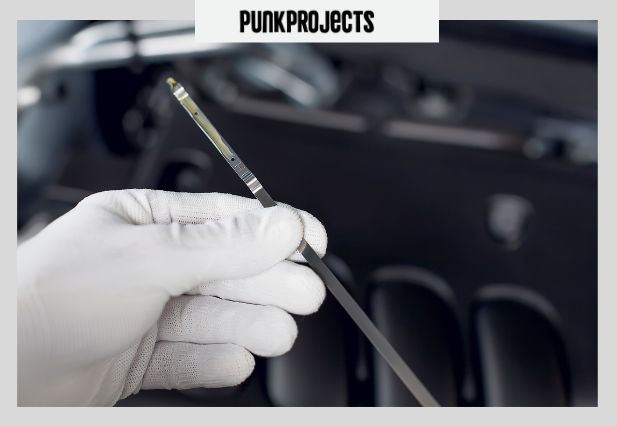
When lubrication is inadequate due to lack of oil, wear and tear on these components can cause them to fail, leading to engine problems. Other signs and symptoms of engine damage due to running without sufficient oil include misfires and other poor performance issues, as well as spark plug fouling and premature spark plug failure. In some cases, an absence of oil pressure may also be present.
Your mechanic can further diagnose any damage that has been caused by insufficient lubrication with a visual inspection during an engine teardown or a pressure test for low-end systems.
How To Tell if Engine is Damaged From Overheating
Overheating can cause significant damage to an engine if not addressed quickly. The heat generated by the combustion process increases the pressure inside the engine and causes certain areas of metal components to expand, while other areas remain in place, compromising the overall structure over time.
This can lead to problems such as piston seizing, valve damage and ultimately catastrophic failure. Thankfully, you may be able to detect overheating before your engine is permanently damaged by paying attention to a few key warning signs.
Warning Signs of Overheating:
- Leaking or low coolant levels
- Steam or smoke coming from under the hood
- Flashing “check engine” light
- A burning smell from your engine
- Low oil pressure readings on your dashboard gauge
- Rough vehicle performance/uneven acceleration
Signs of Internal Engine Damage
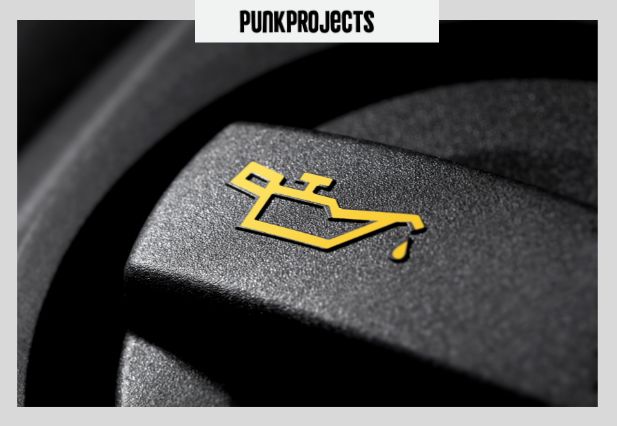
To detect internal engine damage, some common signs to look out for include extreme fluid leakage, unusual smoke coming from your exhaust, a rattling noise when you start your car or while you’re driving it, a decrease in power or acceleration performance, or even poor fuel economy with no other apparent causes. It’s also important to be vigilant if you see drops of oil accumulating underneath your vehicle — perhaps indicating an internal leak or breakage.
Given the expense associated with engine repair work and replacement parts for more serious damage cases – not to mention that an unkempt vehicle is generally a safety hazard — it’s highly recommended to complete regular maintenance checks as required by your manufacturer in order to spot any warning signs early on before they become too costly and more difficult problems to fix.
Signs of Low Engine Oil
To prevent this from occurring, it is important to be aware of common signs that you may need to add oil such as:
– Decreased Oil Pressure: On the instrument panel in your vehicle you will see an Oil pressure light. If it appears when you start your engine or stays lit during normal operation, this is a sign that your oil pressure is running low and could be due to low engine oil levels. Consult your owner’s manual for instructions on how to check and/or add engine oil if necessary.
– Clicking Noises: Clicking noises from inside the car’s engine are another indicator there may not be enough lubrication. Make sure to listen for any strange noises when driving or revving up in Neutral.
– Excessive Smokes: Engine smoke coming out of the exhaust could also indicate low levels of oil caused by insufficient lubrication. For many cars, smoke will come out blue, indicating an issue with the amount of transmission fluid being used instead of motor oil.
– Rough Idling: Rough idling or stalling can indicate that there’s not enough lubrication within the system which consequently lowers overall performance capabilities and increases emissions as a result.
If you’re experiencing any of these issues, make sure you check your motor oil level right away before additional damage can be done by insufficient lubrication!
Engine Ran Without Oil Now Knocking
The most common cause of this is known as “Hydraulic lock” — where extreme heat has caused something like water getting into the pistons, seals, and bearings overheating them beyond repair. This will tend to be more common in engines like those in manual cars that rev up more than 4,000 RPMs and are stressed from hard acceleration or idling for long periods of time.
In order to properly diagnose what action needs to be taken, it is important that a mechanic perform an inspection of the internal components. A knock sensor should also be inspected for any damage as well as checking for regular maintenance protocols that may have been underperformed which can affect safe operation.
Depending on the severity of the damage and the overall condition of your engine before it ran out of oil, it may necessitate further maintenance or even a complete replacement in order to restore proper functioning and reliability going forward.
How Long Engine Can Run Without Oil
If an engine continues to be operated without oil, it can run for a few minutes before substantial damage occurs. Depending on external factors like fuel quality and weather conditions, this time may be longer or shorter. In some cases, damage could start after just seconds of running materials without oil.
Because the consequences of running a car with no oil can be so severe and expensive, it is important for all vehicle owners to perform routine maintenance checks according to their owner’s manual in order to prevent accidental oil depletion. Checking the dipstick regularly or changing the oil after every 3-5 thousand miles is well worth the investment in preserving your car’s longevity!
No Oil in Car But No Warning Light
If you discover that your car has been running without oil, there are a few steps to determine if engine damage has occurred. The first step is to check the dipstick. If the dipstick shows no oil, or very low levels of oil, then it is likely that the engine needs attention from a qualified technician or mechanic.
You should also check for any visible signs of smoke coming from the engine compartment, as well as around any of the exhaust components. Additionally, if you hear any unusual rattling noises when attempting to start the car, this could be an indication of possible harm caused by not having enough oil in the car’s system. The engine should run smoothly and quietly when started in a well-lubricated state.
If Your Engine has No Oil Will it Start?
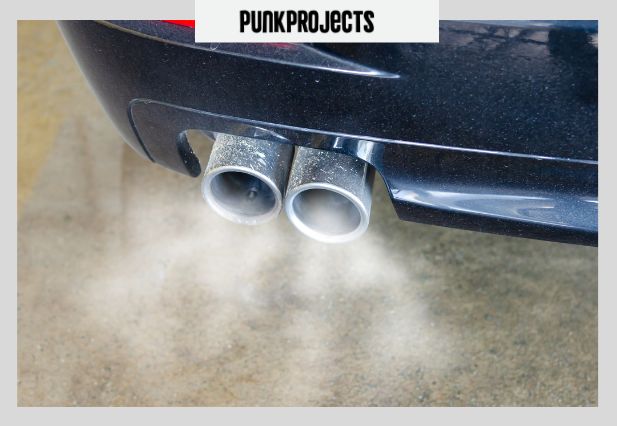
When you attempt to start the engine, the internal parts can become severely damaged from lack of lubrication. Without oil present in the engine, metal components like pistons and bearings can heat up and rub against each other causing excessive friction. This can lead to scoring and seizing of the components which could lead to complete engine failure.
Additionally, not having enough oil will stop crucial parts from rotating or moving at all resulting in poor performance or worse, a stalled engine. If an engine is run without any lubricating oil in its crankcase, it will quickly suffer irreparable damage that cannot be fixed without a major overhaul or replacement of key components.
Will Engine Shut Off If No Oil?
If your engine has no oil, it will eventually shut off due to the fact that it can no longer run without lubrication. Without oil, your engine will heat up rapidly and over time the internal components of the engine will start to fail.
When an engine is running without enough or any oil it is immediately put into distress. The audible sound of an engine running without oil can help tell you if there is a problem – enough noise from your car could be a good indication that something isn’t right.
Best Oil For Engine
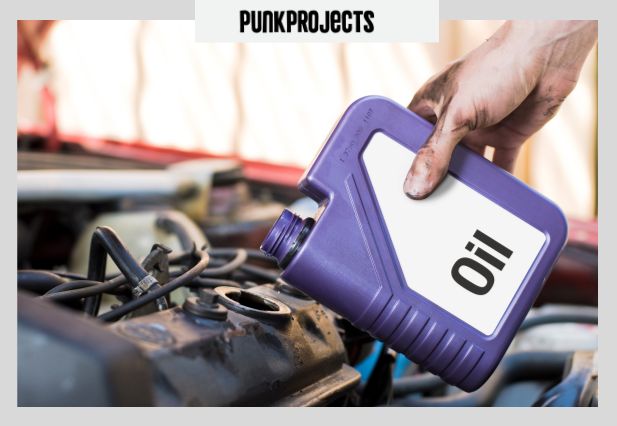
Engine oils have different characteristics and generally fall into two categories: mineral oils or synthetic oils. Mineral oils are derived from natural crude oil and are used as a conventional engine lubricant, while synthetic oils are chemically engineered to provide superior protection and performance over mineral-based options.
When selecting the best oil for your engine, you should be familiar with the following:
- The viscosity rating (measurement of flow at operating temperature) required for your vehicle based on its make, model, and year.
- Any specific detergent requirements for which you intend use it to supplement the manufacturer’s recommendation.
- API Service Classifications system that indicates if an oil meets minimum requirements outlined by the American Petroleum Institute (API).
- Viscosity index associated with it that helps determine how an oil performs under different temperatures and conditions.
- Performance Additives added to increase its ability to protect against wear/tear/corrosion, reduce deposits/deposit formation, decrease friction/friction related heat build up.
What Happens to an Engine Without Enough Oil?
If an engine does not have enough oil on a regular basis it can lead to increased friction between parts and higher fuel consumption from the added stress on the vehicle. It is important that vehicles are regularly serviced and receive proper amounts of oil every month in order to maintain their performance level and prevent any permanent damage to their engines.
Frequency Ask Question
What should I do if I suspect my engine has been damaged from no oil
If you suspect that your engine has been damaged due to a lack of oil, it is important to have it inspected by a professional mechanic as soon as possible to prevent further damage and potential engine failure.
Can I drive my car if it is low on oil?
It is not recommended to drive your car if it is low on oil as it can cause damage to the engine. If your car is low on oil, it is important to add more oil as soon as possible or have it serviced by a professional mechanic.
How often should I check my oil level?
It is recommended to check your oil level at least once a month or before long trips. Additionally, it is important to have your oil changed regularly as recommended by your vehicle manufacturer.
Can an engine be fixed if it has been damaged from no oil?
It depends on the extent of the damage. Minor damage may be repairable, but severe damage may require the engine to be replaced. It is best to consult with a professional mechanic to determine the extent of the damage and the best course of action.
What are the signs of engine damage from no oil?
Some common signs of engine damage from no oil include engine knocking or ticking sounds, overheating, low oil pressure, smoke or burning smell, and loss of power or acceleration.
I am a multi-talented designer and contractor with over 10 years of experience in the field. I have a passion for creating beautiful, innovative spaces that reflect my clients’ needs and styles. My skills include architectural design, interior design, space planning, project management and construction supervision.
